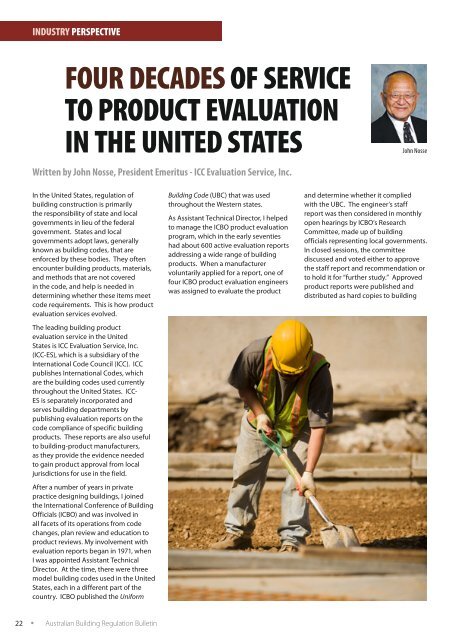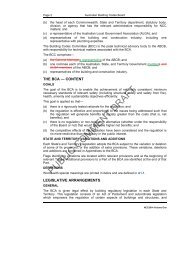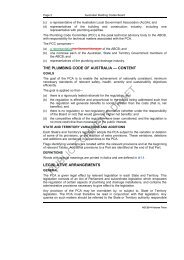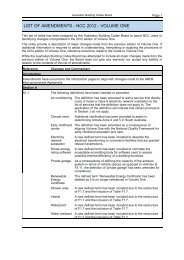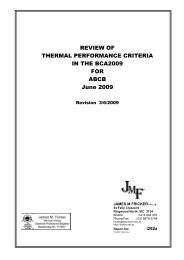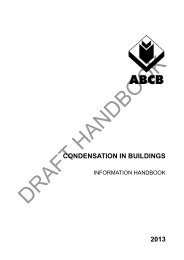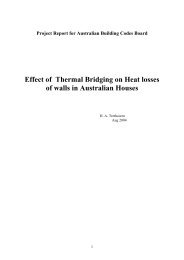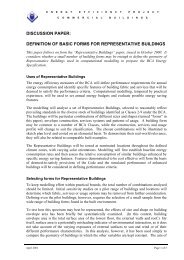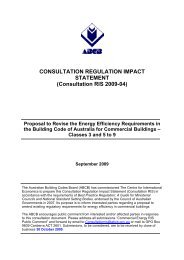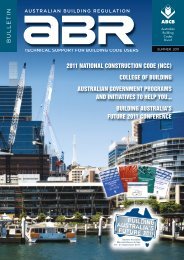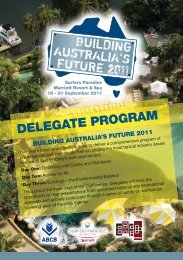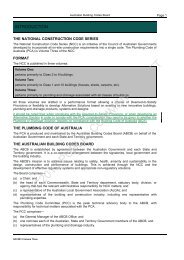BCA 2010 - ABCB - Australian Building Codes Board
BCA 2010 - ABCB - Australian Building Codes Board
BCA 2010 - ABCB - Australian Building Codes Board
You also want an ePaper? Increase the reach of your titles
YUMPU automatically turns print PDFs into web optimized ePapers that Google loves.
INDUSTRY Perspective<br />
Four Decades of Service<br />
to Product Evaluation<br />
in the United States<br />
John Nosse<br />
Written by John Nosse, President Emeritus - ICC Evaluation Service, Inc.<br />
In the United States, regulation of<br />
building construction is primarily<br />
the responsibility of state and local<br />
governments in lieu of the federal<br />
government. States and local<br />
governments adopt laws, generally<br />
known as building codes, that are<br />
enforced by these bodies. They often<br />
encounter building products, materials,<br />
and methods that are not covered<br />
in the code, and help is needed in<br />
determining whether these items meet<br />
code requirements. This is how product<br />
evaluation services evolved.<br />
The leading building product<br />
evaluation service in the United<br />
States is ICC Evaluation Service, Inc.<br />
(ICC-ES), which is a subsidiary of the<br />
International Code Council (ICC). ICC<br />
publishes International <strong>Codes</strong>, which<br />
are the building codes used currently<br />
throughout the United States. ICC-<br />
ES is separately incorporated and<br />
serves building departments by<br />
publishing evaluation reports on the<br />
code compliance of specific building<br />
products. These reports are also useful<br />
to building-product manufacturers,<br />
as they provide the evidence needed<br />
to gain product approval from local<br />
jurisdictions for use in the field.<br />
After a number of years in private<br />
practice designing buildings, I joined<br />
the International Conference of <strong>Building</strong><br />
Officials (ICBO) and was involved in<br />
all facets of its operations from code<br />
changes, plan review and education to<br />
product reviews. My involvement with<br />
evaluation reports began in 1971, when<br />
I was appointed Assistant Technical<br />
Director. At the time, there were three<br />
model building codes used in the United<br />
States, each in a different part of the<br />
country. ICBO published the Uniform<br />
<strong>Building</strong> Code (UBC) that was used<br />
throughout the Western states.<br />
As Assistant Technical Director, I helped<br />
to manage the ICBO product evaluation<br />
program, which in the early seventies<br />
had about 600 active evaluation reports<br />
addressing a wide range of building<br />
products. When a manufacturer<br />
voluntarily applied for a report, one of<br />
four ICBO product evaluation engineers<br />
was assigned to evaluate the product<br />
and determine whether it complied<br />
with the UBC. The engineer’s staff<br />
report was then considered in monthly<br />
open hearings by ICBO’s Research<br />
Committee, made up of building<br />
officials representing local governments.<br />
In closed sessions, the committee<br />
discussed and voted either to approve<br />
the staff report and recommendation or<br />
to hold it for “further study.” Approved<br />
product reports were published and<br />
distributed as hard copies to building<br />
22 • <strong>Australian</strong> <strong>Building</strong> Regulation Bulletin


